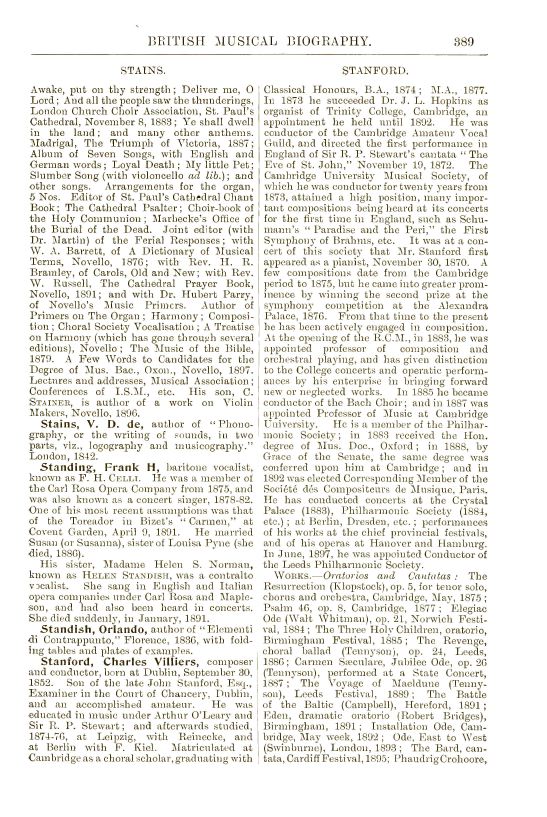- Stanford, Charles Villiers
[E] Stanford, Charles Villiers, composer
and conductor, born at Dublin, September 30,
1852. Son of the late John Stanford, Esq.,
ExaiTiiner in the Court of Chancery, Dublin,
and an accomplished amateur. He was
educated in music under Arthur O'Leary and
Sir R. P. Stewart ; and afterwards studied,
1874-76, at Leipzig, with Reinecke, and
at Berlin with F. Kiel. Matriculated at
Cambridge as a choral scholar, graduating with
Classical Honours, B.A., 1874 ; M.A., 1877.
In 1873 he succeeded Dr. J. L. Hopkins as
organist of Trinity College, Cambridge, an
appointment he held until 1892. He was
conductor of the Cambridge Amateur Vocal
Guild, and directed the first performance in
England of Sir R. P. Stewart's cantata " The
Eve of St. John," November 19, 1872. The
Cambridge University Musical Society, of
which he was conductor for twenty years from
1873, attained a high position, many impor-
tant compositions being heard at its concerts
for the first time in England, such as Schu-
mann's " Paradise and the Peri," the First
Symphony of Brahms, etc. It was at a con-
cert of this society that Mr. Stanford first
appeared as a pianist, November 30, 1870. A
few compositions date from the Cambridge
period to 1875, but he came into greater prom-
inence by winning the second prize at the
symphon}^ competition at the Alexandra
Palace, 1876. From that time to the pre.sent
he has been actively engaged in composition.
At the opening of the R.C.M., in 1883, he was
appointed professor of composition and
orchestral playing, and has given distinction
to the College concerts and operatic perform-
ances by his enterprise in bringing forward
new or neglected works. In 1885 he became
conductor of the Bach Choir ; and in 1887 was
appointed Professor of Music at Cambridge
University. He is a member of the Philhar-
monic Society; in 1883 received the Hon.
degree of Mus. Doc, Oxford; in 1888, by
Grace of the Senate, the same degree was
conferred upon him at Cambridge ; and in
1892 was elected Corresponding ilember of the
Societe des Compositeurs de Musique, Paris.
He has conducted concerts at the Crystal
Palace (1883), Philharmonic Society (1884,
etc.) ; at Berlin, Dresden, etc. ; performances
of his works at the chief provincial festivals,
and of his operas at Hanover and Hamburg.
In June, 1897, he was appointed Conductor of
the Leeds Philharmonic Society.[W] Works. — Oratorios and Cantatas : The
Resurrection (Klopstock), op. 5, for tenor solo,
chorus and orchestra, Cambridge, jMay, 1875 ;
Psalm 46, op. 8, Cambridge, 1877 : Elegiac
Ode (Walt Whitman), op. 21, Norwich Festi-
val, 1884 ; The Three Holy Children, oratorio,
Birmingham Festival, 1885 ; The Revenge,
choral ballad (Tennyson), op. 24, Leeds,
1886 ; Carmen Sseculare, Jubilee Ode, op. 26
(Tennyson), performed at a State Concert,
1887 ; The Voyage of Maeldune (Tenny-
son), Leeds Festival, 1889 ; The Battle
of the Baltic (Campbell), Hereford, 1891 ;
Eden, dramatic oratorio (Robert Bridges),
Birmingham, 1891 ; Installation Ode, Cam-
bridge, May week, 1892 ; Ode, East to West
(Swinburne), London, 1893 ; The Bard, can-
tata, Cardiff Festival, 1895; PhaudrigCrohoore,
choral ballad, Norwich, 1896. Operas : The
Veiled Prophet of Khorassan, composed, 1877,
produced at Hanover, Februarj' G, 1881
(libretto by W. Barclay Squire) ; Savonarola,
produced, Hamburg, April 18, 1884 ; The
Canterburj' Pilgrims, produced, Coveiit Garden
Carl Rosa), April 28, 1884 (libretto by G. A.
A'Beckett) ; and Shamus O'Brien, Opera
Comique, London, March 2, 1896 (text by G.
H. Jessoi? from Le Fanu). Incidental music
to Tennyson's Queen Mary, Lyceum, April 18,
1876 ; Tennyson's Becket, Lyceum, February
6, 1893 ; ^schylus' Eumenides, Cambridge,
1885 ; Sophocles' CEdipus, Cambridge, 1887.
Mass in G, op. 46 (in memoriam, Thonias
Wingham), Brompton Oratory, May 26, 1893;
Psalm 150, Manchester, 1887 ; Awake, mj-
heart (Klopstock), choral hymn, op. 16, St.
Paul's Cathedral, November 3, 1881 ; Morning,
Evening, and Communion Services in B fiat,
F, and A ; Anthems, etc. Elizabethan Pas-
torals, 4 voices; Three Cavalier songs, op. 18;
Day is dying; To the rose; Eight songs
(George Eliot), op. 1 ; two sets of 6 songs
(Heine), op. 4, 7 ; and other songs. Editor of
fifty Irish melodies, 1883 ; Song book for
schools, 1884; Irish songs and ballads, Novello,
1893 (?) ; The Irish melodies of Thomas Moore,
Boosey, 1896. Orchestral : Symphony No. 1,
in B flat (prize), 1876; No. 2, in D minor
(Elegiac), Cambridge, March 7, 1882 ; No. 3,
in F minor (Irish), Richter, June 27, 1887;
No. 4, in F (Thro' youth to strife ; thro' death
to life), Berlin Philharmonic Society, January
14, 1889 ; No. 5, in D (L'Allegro ed il Pensi-
eroso), op. 56, Philharmonic Society, London,
March 20, 1895. Serenade, op. 17, Birming-
ham Festival, 1882. Overtures, Festival, in B
flat, Gloucester Festival, 1877 ; Queen of the
Seas (Armada Tercentenary), 1888. Concerto,
'cello and orchestra (MS.) ; Concerto in G, op.
59, pf. and orchestra, Richter, May 27, 1895 ;
Suite in D, violin and orchestra, Berlin, Jan-
uary 14, 1889. Chamber Music : Sonata in A,
op. 9, pf. and 'cello ; in D, op. 11, pf. and
violin ; Three intermezzi, pf. and clarinet, op.
13 ; Quartet in F, op. 15, pf. and strings ;
Quartet in D minor, op. 25 (Dannreuther),
1886 ; Trio in E fiat, op. 35 ; Sonata in D
niinor, op. 39, pf. and 'cello. Popular Concerts,
November 18, 1889; String Quartets in G, op.
44 ; A minor, op. 54 ; D minor, op. 64. Pour
Irish pieces, violin and pf. Sonata in D flat,
op. 20 ; Three pieces, op. 42 ; Toccata in C,
etc., for pf. Prelude and Fugue, organ, Pro-
fessor Stanford's latest work is a Requiem
Mass, accepted for perfornaance at the
Birmingham Festival of 1897.entry id: 389-L-54

page 389 - view at internet archive
